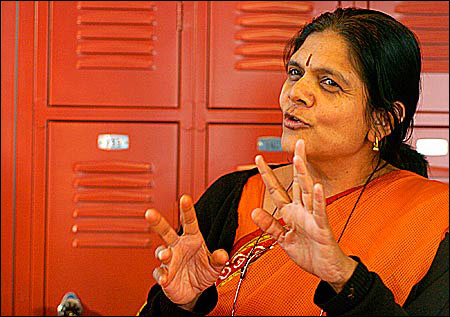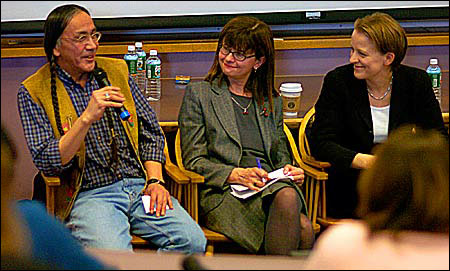Bridge Builders unites organizers
Grassroots leaders make connections

A group of grassroots organizers from around the world spent last week at Harvard’s John F. Kennedy School of Government, sharpening their skills and making connections with academic experts, Harvard students, and other grassroots leaders.
The Bridge Builders 2005 conference attracted participants with a wide variety of backgrounds, including two fighting AIDS in Ukraine and Uganda and an activist for indigenous housekeepers and domestic workers in Bolivia.
Other participants are fighting to preserve indigenous culture in Ecuador, running a micro-finance bank in India, battling for basic health and economic rights in Nicaragua, and seeking rights for the Buffalo River Dene Nation in Canada.
Held Feb. 13 to 18, the student-run conference is in its third year and brings in guest speakers from Harvard’s faculty and beyond.

Sarah Hay, a student at the Graduate School of Education and the event’s co-chair, said the conference has several aims. It includes small private sessions with the invited participants, called “Bridge-builders,” that are targeted to build skills needed to achieve their aims, such as speaking skills, communicating messages effectively, fundraising, and organizational development.
The conference also included several larger public sessions, where the participants share their stories with each other and students and faculty at Harvard.
“[Our goal] is to link people working on the ground with academics, to link practitioners with scholars, because often there’s a disconnect,” Hay said. “We’re trying to combat the ‘ivory tower’ effect. We’re studying development and we have field experience, but rarely do the two meet.”
One of this year’s participants is a 2003 bridge-builder who has been invited back to serve as a mentor for the current group. Chetna Sinha organized local women in Maharashtra, India, to create a local entrepreneurship enterprise centered on a local bank. The bank invests in businesses built around local women’s traditional skills, giving them an ownership stake in activities in which they had previously been laborers.
Since participating in the first Bridge Builders conference, Sinha said she has hosted several Harvard students, who have helped by adding their own expertise to her enterprise.
If Sinha had one message to this year’s participants, it would be hopeful encouragement.
“We are creating another world,” Sinha said.
At a public event on Thursday (Feb. 17), a panel of bridge-builders and invited speakers discussed human rights as they relate to the legal and economic battles of indigenous and other struggling people.
Bridge builders Eduardo Gamez of Nicaragua and Adelard Blackman of Canada were joined by Oxfam trade organizer Brian Rawson and United Nations representative for Human Rights Watch Joanna Weschler. Fernande Raine, executive director of the Carr Center for Human Rights moderated the event.
Blackman discussed the plight of his people, the Buffalo River Dene Nation in Saskatchewan, Canada. The group is seeking redress of treaty violations, Blackman said, in regards to loss of land, loss of natural resources, and genocide. The 900-member tribe is living in Canada, a nation held up as a model of human rights, but the tribe is dealing with poverty and high death and suicide rates.
Blackman said he’s been impressed with the support he’s received in his efforts from other native people. He also said that his being invited to Harvard has boosted spirits of the people back home.
“It is incredible, in reaching out for help, the support we’re getting from indigenous people around the world,” Blackman said.
Gamez described the difficulties his people face in Nicaragua. He said local workers’ efforts are hampered by the influx of cheap sugar and other items from outside of Nicaragua. The local sugar factory closed, he said, putting 4,000 people out of work. They aren’t looking for international aid, he said, but are instead hoping for investments that can be used for self-sustaining projects.
Rawson’s efforts could help. Oxfam is fighting what it sees as unfair trade practices in the United States in the form of government subsidies to large corporate agricultural concerns. The surplus products these enterprises produce are sold in other countries, often undercutting the prices charged by local farmers. Rawson described Oxfam’s public education efforts aimed at getting these subsidies reduced.
Rawson said the outpouring of private donations after the recent tsunami disaster shows that Americans are willing to help. He said most people just don’t understand that, as he sees it, our trade policies are doing more economic damage than we can fix with donations.
“We say that trade has the potential to lift people out of poverty,” Rawson said. “The solution is within our reach. If trade is fair, then poverty can be resolved for millions.”




